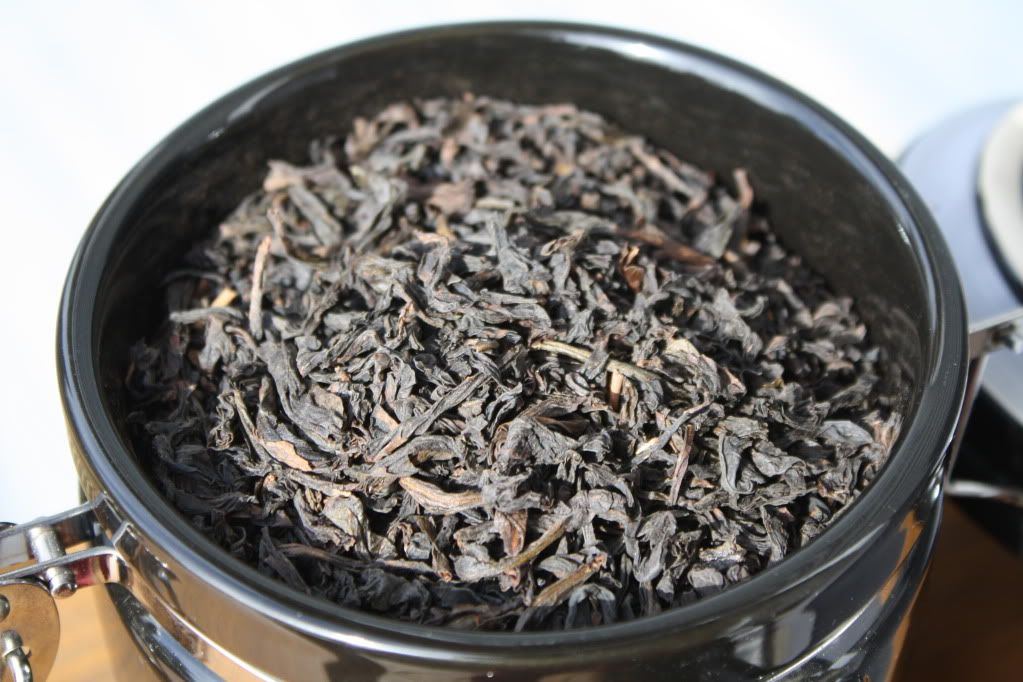I recently made the somewhat difficult decision to open a large canister of oolong I'd been planning to age. It's a 2008 Traditional Shui Xian from Jing Tea Shop, and I've been storing it for just about a year myself with hopes of opening it much later and enjoying a delightful aged yan cha (right?). The present question is, why open it instead of continuing to age it?
From what I've experienced, there seem to be three different types of aged yan cha. First is the well-roasted type that tastes overly of charcoal when it's first processed. Impatient me, I usually enjoy and drink these types of tea regularly without aging, but have also had numerous examples of three to five year-old teas that taste really nice. The charcoal aspect seems to lose its sharpness and ease off into a more rounded, mellow darkness. I wouldn't really consider these teas aged--more "set-aside" to balance the flavors and become ideal for drinking. For the most part, they still taste like young yan cha. The second kind of aged yan cha is the well-aged, old variety. Here we're talking much older, definitely more than 10 years and upwards of 15 or 20. These teas don't taste much like young yan cha at all. They're more like other aged (usually Taiwanese) oolongs--plummy, mellow, sweet, and without as strong a tea taste. If they were heavily roasted when they were young, they're usually full of dark flavor notes, and if they were less roasted then they tend to have more shifting, sometimes sour high notes. I'd venture to call this the ideal for aged yan cha. The third type of aged tea is more of an odd duck--I've tasted teas of this stripe that were supposedly from the 90's, and I've tasted teas that taste eerily similar that range from five to only a couple of years old. They generally don't taste like young yan cha (not much of a charcoal note at all) but they don't taste like the other aged yan cha. The flavor is vaguely plummy and a bit aged, but not usually as complex as the second type. There's nothing wrong with this type of aged tea, but from the ones I've had, they all taste pretty similar to each other and none have been as satisfying as an "ideal," a "set-aside" or just a good new yan cha. My experiences are pretty limited, so this type may be what's considered standard aged yan cha, so maybe I'm getting it wrong, but I'm really hoping that not very many of the teas I've set aside turn out this way.
This brings me back to the tea I've just reopened. When I chose to age some of it a year ago I did so based on the fact that I really enjoyed drinking it--though it's a very reasonably-priced tea ($7/oz, I think) it has the roast level, body and flavor/aroma I look for in an everyday yan cha. I've since had a bit of trouble finding teas like this to drink regularly, let alone age. In the meantime I've been trying a number of "aged" teas of the third variety that make me worry for my aging experiments. If this tea were to turn out like those, I'd end up with a passable but not excellent aged tea that I would have enjoyed much more in its youth. It seems like it's probably better to leave the aging risk to the other teas I've set aside that aren't quite as high on my "ideal to drink now" list. If they don't turn out fantastic, at least I won't have lost the chance to drink them when I would have enjoyed them most. After a year's home storage, this tea is still tasting really nice. It's still a bit drier than the 2010 Traditional Shui Xian, but it still has the nice creamy mouthfeel that its younger counterpart has in even more abundance. Its roast is pretty high, if not the highest I've had, which puts it in the first category, which is probably the one I prefer most on a daily basis--it's a tea that's been set aside for a few years and it's reached an ideal balance but still tastes like new yan cha.
This last point touches on an interesting lesson I have to continually remind myself about. That is, you always have to ask yourself why you're aging a tea. Is it an experiment--can my aged tea taste as good as the one I bought that was aged by somebody else? Is it because the tea is shitty and you're hoping the aging process will turn it into something worth drinking? I've got a couple of those. Is it because you prefer the aged version of the tea and aren't interested in the young one? That's basically my stance on young sheng pu-erh, which I appreciate but rarely drink for enjoyment. When I buy young sheng, it's purely for the sake of aging--the main risk is that it won't age. If you buy something with the intention of aging it but actually love it just how it is now, you could find yourself wishing you drank it when it tasted how you liked it. It's easy to get caught up in the "aged is better" attitude but you'll always benefit if you're realistic about your tastes. I drink aged oolongs casually and occasionally, so why should I commit a huge amount of tea to aging when I'd enjoy it more now, even if it turns into a good aged tea? No sense incurring "ager's remorse"!
Subscribe to:
Post Comments (Atom)



No comments:
Post a Comment